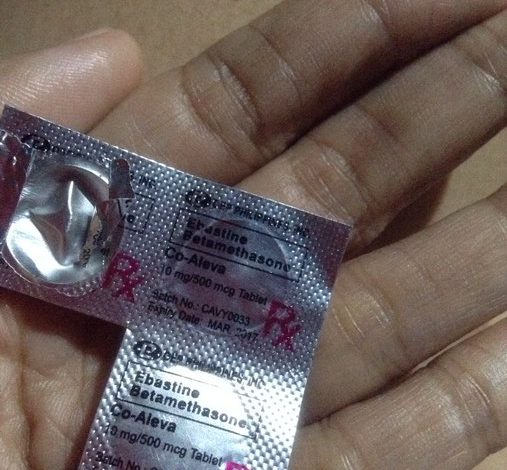Co-Aleva 10 mg / 500: Ingredients, Uses, Dosage, Side Effects, Interactions

Co-Aleva is a medication used for the treatment of seasonal or perennial allergic rhinitis and chronic urticaria. It contains Ebastine 10mg and Betamethasone 500mcg. Ebastine is an anti-allergic medication that helps to alleviate the effects of allergic reactions including hay fever and urticaria (hives). Sneezing, runny nose, itchy eyes, skin rashes, redness of the eyes, and other symptoms can be cured. It is a piperidine derivative that binds preferentially to peripheral H1 receptors and is a long-acting, non-sedating second-generation histamine receptor antagonist.
Betamethasone is in a class of medications called corticosteroids. It works by activating natural substances in the skin to reduce swelling, redness, and itching. It is used to treat conditions such as allergic reactions, dermatologic disease, endocrine disorders, gastrointestinal disease, hematologic disorders, neoplastic disease, ophthalmic diseases, renal diseases, rheumatic disorders, and disorders affecting the nervous system. These two drugs (Ebastine and Betamethasone) work in synergy to treat allergic rhinitis and chronic urticaria.
How should I take Co-Aleva?
Take Co-Aleva exactly as prescribed by your doctor. Before starting the treatment, read the manufacturer’s printed information leaflet from inside the pack and any additional information you are given by your doctor.
Your doctor or pharmacist will tell you how many tablets to take and when to take them. This information will also be printed on the label of the packet of tablets to remind you about what was said to you. It is usual to take one dose a day. If you are taking it for an inflammatory condition, it is best to take the tablets each morning after breakfast. If you are taking it for other conditions, it is likely you will be advised to take your doses at night.
Take your doses with food, such as after a meal or with a snack. If you forget to take a dose at your usual time, take it as soon as you remember (with something to eat). If you do not remember until the following day, leave out the missed dose. Do not take two doses together to make up for a forgotten dose.
Depending upon your medical condition, you will either be asked to take Co-Aleva regularly every day or take it daily for a short course of treatment. It is important that you take the tablets exactly as your doctor tells you to. Stopping taking the tablets suddenly after taking them for more than three weeks can cause problems, so your doctor will probably want you to reduce your dose gradually if and when this becomes necessary.
Can a pregnant or breastfeeding woman take Co-Aleva?
No, pregnant women and breastfeeding mothers should avoid Co-Aleva. Patients with severe liver insufficiency and those hypertensive to any of the two ingredients should also avoid the medication.
In addition, Co-Aleva is contraindicated in patients with cardiac risk (e.g. long QT syndrome, heart failure, recent myocardial infarction or hypertension), hypokalemia, diabetes mellitus, epilepsy, glaucoma, hypothyroidism, hepatic failure, osteoporosis, peptic ulcer disease, psychoses or severe affective disorders, renal impairment.
What medications can interact with Co-Aleva?
Drugs that produce an increase in QT interval, cytochrome P3A4 inhibitors (e.g. azole antifungals, macrolides), barbiturates, carbamazepine, phenytoin, primidone or rifampicin, oral contraceptives, ritonavir, thiazides, furosemide, amphotericin B, xanthine or beta 2-agonists, non-steroidal anti-inflammatory drugs, anticoagulants, antidiabetics, antihypertensives, antimuscarinics.
What are the side effects of Co-Aleva?
The more common side effects that can occur with Co-Aleva include:
• Increased blood sugar level. Symptoms may include:
o confusion
o more frequent urges to urinate
o feeling sleepy, thirsty, and hungry
• Trembling, dizziness, weakness, fatigue, and fast heartbeat
• Low potassium level, which can cause muscle pain and cramps
• Skin changes, such as:
o pimples
o stretch marks
o slow healing
o hair growth
• Signs of infection, including:
o fever
o chills
o cough
o sore throat
• Mood and behavior changes
• Menstrual changes, such as spotting or skipping a period
• Vision changes, including blurred vision
• Headaches
• Dry mouth
• Weight gain
• Sweating
• Restlessness
• Nausea
Serious side effects
Call your doctor right away if you have serious side effects. Call 911 if your symptoms feel life-threatening or if you think you’re having a medical emergency. Serious side effects and their symptoms can include the following:
• Wheezing
• Chest tightness
• Fever
• Swelling of your face, lips, tongue, or throat
• Seizure
• Blue skin color
• Infection. Signs may include:
o cough
o fever
o chills
Co-Aleva may cause other side effects. Call your doctor if you have any unusual problems while using this medication. If you experience a serious side effect, you or your doctor may send a report to the Food and Drug Administration’s (FDA) MedWatch Adverse Event Reporting program online (http://www.fda.gov/Safety/MedWatch) or by phone (1-800-332-1088).
Is Co-Aleva an antibiotic?
No, Co-Aleva is not an antibiotic but an anti-allergy medication that contains ebastine, a non-sedating antihistamine, and betamethasone a corticosteroid.
Is Co-Aleva an over-the-counter drug?
No, in most countries including the Philipines, Co-Aleva is a prescription-only medication and a doctor’s prescription is required to obtain the medication. In order to buy Co-Aleva online, you will need to upload a doctor’s prescription and proof of identification before online pharmacies can dispense the medication.





